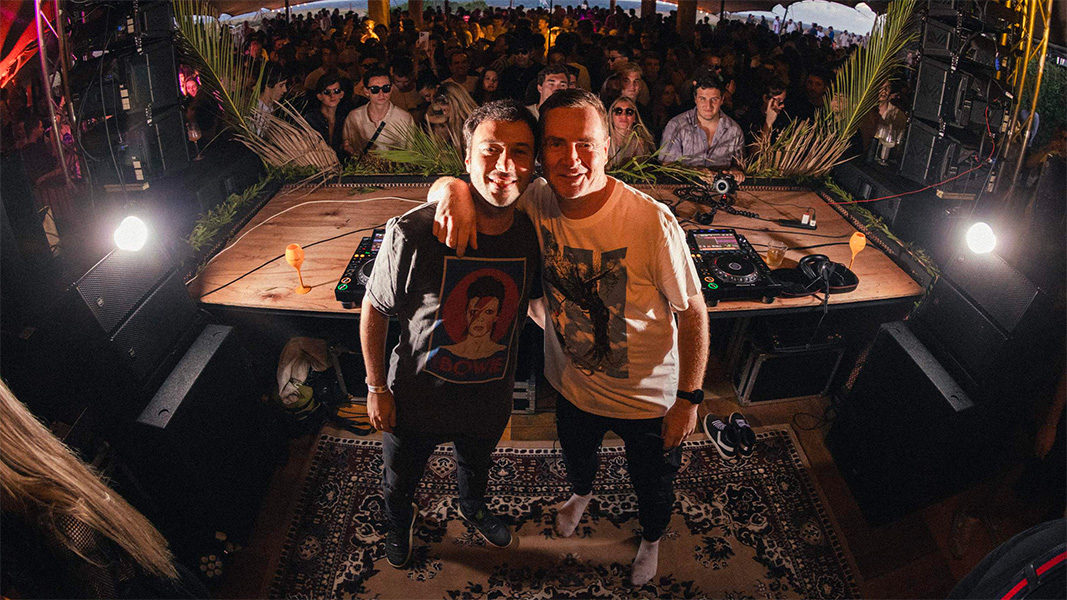Over the last number of years London natives Dense & Pika have risen through the ranks of the techno scene to cement their place as one of the most exciting acts coming out of the UK today. Playing sets in every corner of the globe and standing toe to toe with every producer and DJ worth their salt. We recently had the pleasure of sitting down to talk with them about the state of things in London and particularly Fabrics recent closure.
WWD: Hey guys, the closure of Fabric is on everyone’s mind at the minute and the state of things in London. What’s going down?
Alex: Yeah well it’s pretty bad. I mean I went to Fabric pretty much the day it opened and then religiously every weekend for years. You know that’s where I cut my teeth really. Like Craig Richards was my hero growing up and I mean it really is a huge blow and I honestly don’t know if it’s going to come back. Because the area where it is, is so affluent and the building itself is worth so much money and there are so many media companies and stuff like that around there. And frankly I think that Islington council don’t want the club there. There is a reason that so many clubs are out east in industrial estates these days and it’s because London is so affluent and is just pushing these clubs further and further out. But it would be a huge hammer blow and there would be nowhere left that’s a purpose built super club and you’re not going to get that again and it would just be such a he loss. I mean I think it’s bizarre that the council or that the London mayor office don’t take example from Berlin and do what they do with Berghain which is funded by the government as a tourist attraction.
WWD: Well it seems like the two big cities in Europe when it comes to techno seem to be London and Berlin and yet their policies in relation to clubs couldn’t be further apart.
Alex: Exactly! The thing is London won’t be one of the big techno cities in Europe, if Fabric closes I think it doesn’t have the pedigree. I mean it’s got the producers but if Fabric stays closed the it doesn’t really have a flagship club. I suppose things will probably revert back to Ministry of Sound as a cutting edge club. And I mean that technically, not really with their music policy.
Chris: Yeah I agree with everything that you’re saying. I mean it’s a fucking nightmare and I think it’s really silly that they’re being chastised because of what happened. Because you know things like that happen all over the place in pubs and clubs all over. I really believe that they are being used as an example which is very unfair on them.
WWD: I think one of the most interesting things about this whole situation is with the new mayor just being elected one of his biggest policies to capture the young people’s vote was that he’d be the one to turn London nightlife around.
Alex: well yeah that’s the thing is like if this isn’t resolved it will really turn people against him. Like it was the biggest and most famous bit of nightlife in London and more than anywhere else that is London’s flagship club so if he balls’ this up it would just be a classic case of politicians lying wouldn’t it. But I’m not really sure how much weight he actually carries but it’s down to the Islington licensing committee and it’s all just backhanders and large companies pushing their weight around by throwing money in the right directions. I really don’t think they give a shit if Ben Klock played there for eight hours.
WWD: Chris, what do you think is there a possibility in maybe looking at having drug testing stations in clubs as a way to stop people from dying on the dance-floor?
Chris: yeah well doesn’t that already happen at some festivals and stuff like that but at the end of the day young people and kids are going to take drugs all over the place. Whether it be at a house party or whatever it doesn’t matter. But it’s kind of down to the responsibility of the person. Like let’s say you do have the testing things in clubs but how much of the drugs in any given club are actually going to get tested? Like what maybe 20% of the drugs that are in the club may actually get tested. People who’ve got bags full of drugs generally don’t want to go up to someone and ask oh can you please test my drugs before I sell them to people. It’s all illegal and it’s just not an easy situation to navigate at all.
WWD: That policy itself has been brought in various festivals in Australia and I know I Love Techno has also had it for a number of years now and I believe it is becoming fairly common place in Amsterdam as well.
Alex: And they did it at Secret Garden Party as well didn’t they?
WWD: yeah exactly!
Alex: Well I think it’s easier to do it at a festival because for the most part there’s less law and order at a festival. For example, if you’re surrounded by cameras in a nightclub I think people will be thinking twice about it because they might be worried about what their rights are.
WWD: With so much closure of so many clubs in London and perhaps across the UK over the last couple of years. Do you think that’s having an effect on the development of electronic music in London?
Alex: I think the kids who are making all the cutting edge stuff will always have their own sort of party scene first before somewhere like Fabric will have even heard of it, you know? So I don’t think that’s the case that the closure of clubs is slowing the development of electronic music in London. Like places are getting shut down all over the place but there are still people putting on raves in warehouses and stuff you know. You can still go out but it’s just the famous places slowing getting shut down which just means that you will have to look a little bit harder to find what you want. And I think the more underground stuff is actually more underground if it isn’t being played in the most famous clubs. You know what I mean? But it is a shame for sure.
WWD: So you said that you were at fabric the night it opened. What was it like back then and how has it developed over the years?
Alex: At the beginning it used to be a lot of breakbeat stuff. But I used to go to drum and bass nights there. But I always used to go on Fridays and then I grew up a bit and started going on Saturdays. James Lavelle was a resident when I started going and people like Chemical Brothers were playing there.
WWD: Another thing that I wanted to touch on was that at the minute it seems like a lot of British producers and Dj’s have started to relocate to places like Berlin due to the rate of gentrification in London. Do you think this will start to become more common place if in the future?
Chris: Well, Berlin is also starting to become a bit gentrified now. But it isn’t like it used to be, when I moved there my rent was like just under €300 a month and now the same apartment is about three times the price. So it’s definitely gone up a lot in the last few years.
Alex: I’ve heard that there’s a lot of people moving to Margate, the seaside town just outside of London. Because they have a big art gallery there so a lot of artists who are being pushed out of London because of rent prices are heading there.
Chris: So yeah basically Margate is the new Berlin!
Dense & Pika play at District 8, Dublin on Friday 21st Oct, 2016.






